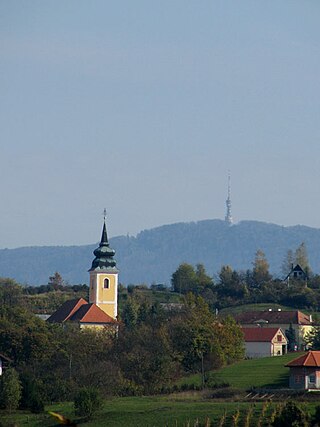See also
- Sveta Marija Magdalena, a village near Tribanj, Zadar County, Croatia
Marija Magdalena (Mary Magdalene in Croatian) may refer to:

Dorotea Budimir, better known as Doris Dragović or simply Doris, is a Croatian singer who has represented Yugoslavia in the Eurovision Song Contest 1986 with the song "Željo moja", finishing 11th with 49 points, and Croatia in the Eurovision Song Contest 1999 with the song "Marija Magdalena", finishing fourth with 118 points.
Bistrica or Bistrice, from Proto-Slavic *bystrъ 'quickly flowing, rushing', may refer to:
A Kraj is the highest-level administrative unit in the Czech Republic and the Slovak Republic. For lack of other English expressions, the Slavic term is often translated as "province", "region", or "territory", although it approximately means "(part of) country", or "(part of) countryside". A kraj is subdivided into okresy ("districts").

Marija Bistrica is a village and municipality in the Krapina-Zagorje County in central Croatia, located on the slopes of the Medvednica mountain in the Hrvatsko Zagorje region north of the capital Zagreb. The municipality has 5,976 inhabitants, with 1,071 residents in the settlement itself.

"Marija Magdalena" is a song by Croatian singer Doris Dragović, released on 7 March 1999. It was written and composed by Tonči Huljić and Vjekoslava Huljić, and produced by Remi Kazinoti. The song won Dora 1999 and represented Croatia in the Eurovision Song Contest 1999 where it finished in fourth place with 118 points. The song also functioned as the lead single for Dragović's twelfth studio album, titled Krajem vijeka. Within Croatia, the song achieved significant popularity and emerged as one of her most prominent musical successes.

The House of Pucić, known also as Pozza in Italian, is a noble family from the Republic of Ragusa.

Marija is a feminine given name, a variation of the name Maria, which was in turn a Latin form of the Greek names Μαριαμ, or Mariam, and Μαρια, or Maria, found in the New Testament. Depending on phonological rules concerning consecutive vowels or the use of the palatal approximant, "Mary" in these languages is Marija if consecutive vowels are disallowed and otherwise Maria.

Marija Gorica is a municipality in western Zagreb County of Croatia on the border with Slovenia.

Pušća is a municipality in Zagreb County in Croatia.
Sveta Marija is a village and a municipality in Međimurje County, Croatia. It is located in the south-eastern part of the county, near the Drava River, approximately 27 kilometres south-east of Čakovec and 11 kilometres east of Prelog, the largest and second-largest city of Međimurje County respectively.
Croatia was represented at the Eurovision Song Contest 1999 with the song "Marija Magdalena", composed by Tonči Huljić, with lyrics by Vjekoslava Huljić, and performed by Doris Dragović. The Croatian participating broadcaster, Hrvatska radiotelevizija (HRT), selected its entry for the contest through Dora 1999. Dragović had previously represented Yugoslavia in 1986 placing eleventh with the song "Željo moja".
Sveti Križ may refer to several places:

Krajem vijeka is the twelfth studio album by Croatian pop singer Doris Dragović, released in 1999. The album was released by Croatia Records, Orfej and Tonika record labels, and produced by eminent Croatian music producer and songwriter Tonči Huljić. Huljić also wrote most of the album's songs. Krajem vijeka also featured the song "Marija Magdalena", with which Dragović won the fourth place at the Eurovision Song Contest 1999.

Povile is a fisherman's village in Croatia on the Adriatic coast beneath the old town of Ledenice. It is connected by the D8 highway. It has two little chapels, St. Mary Magdalene and St. John. The former is still in use and the latter now is a private storage. The chapel of St. Mary Magdalene was built in the 14th century and St. Mary Magdalen in the saint of Povile, with the day of St. Mary Magdalene being celebrated each year on the night of Povile which falls in summer. Prominent cape near the church of St. Magdalena was named Punta Mandalena and is a favorite camping spot.
Podgrađe is a Serbo-Croatian place name, a toponym derived from pod ("below") and grad ("town"), when in the Middle Ages "grad" was a term used for a fort, fortress, castle. It was part of wider urban area of a fortress or a castle, and/or a settlement adjacent to it, and can be referred to or translated as a castle town or a market town, as in nomenclature used for urban development in the medieval Europe.
Trstenik is a South Slavic place name originating from the word trska which means reed. It may refer to:
Svane is a surname. Notable people with the surname include:

Lake Dubrava is a reservoir on the Drava in northern Croatia. It is administratively divided between Međimurje County and Varaždin County, and is bordered by the municipalities of Prelog, Sveti Đurđ and Veliki Bukovec. The Drava flows into the reservoir near the town of Prelog, while the dam is located near the village of Sveta Marija.
Križ may refer to:
Tribanj is a village in the municipality of Starigrad, Zadar County, north Dalmatia. The village consists of seven hamlets: Kozjača, Kruščica, Lisarica, Ljubotić, Običaj, Sveta Marija Magdalena, and Šibuljina. In a geopolitical context, Tribanj was the border of Austrian Kingdom of Dalmatia in the 19th century, and is still viewed as a cultural border between Dalmatia and Croatian Littoral. It is situated on the southern slopes of Velebit mountain, also known as Podgorje.